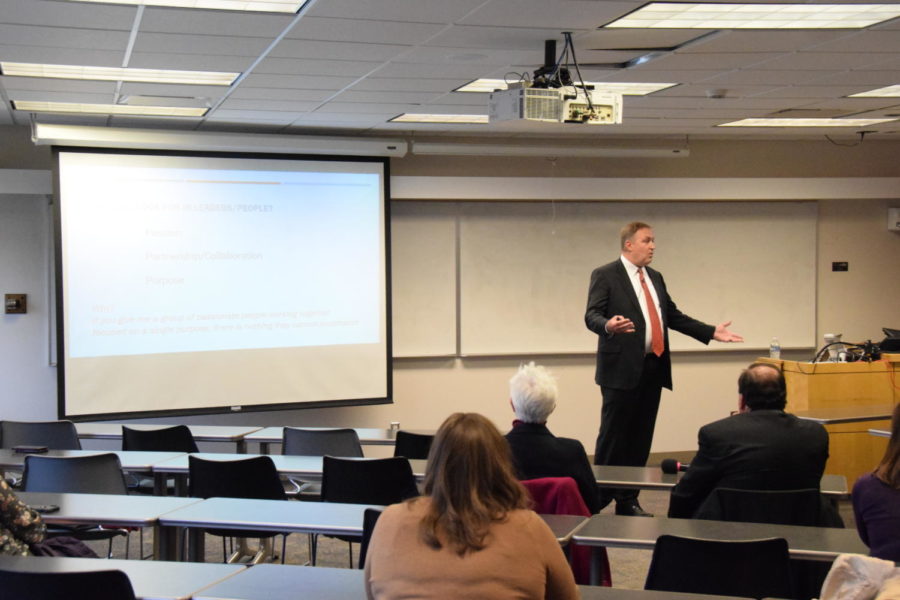Search for vice president for Extension and Outreach continues
Jason Henderson pictured during his presentation at the public forum Iowa State held during the search for a new Vice President for Extension and Outreach.
Iowa State held a public forum with Jason Henderson Monday afternoon as a part of their search for a new Vice President for Extension and Outreach.
Henderson currently serves as director of extension and senior associate dean for faculty at Purdue University. Before starting at Purdue, Henderson worked in the Federal Reserve Bank from 1998 to 2013.
Henderson began and ended his presentation with an anecdote from the history of Brush Creek, Iowa, Henderson’s hometown, which is now named Arlington. Henderson said the answer to the question, ‘How can we make life better?’ is extension.
“Extension for me is the answer because I think about the prospects of the role of a land-grant university,” Henderson said. “Extension and its integration with research and teaching is what makes land grant universities a land grant university, and, ultimately, if you’re going to make community strong, you’ve got to invest in its most promising asset–its people.”
Henderson said the role of a land grant university is to turn research and discoveries into practical applications for families, farms, businesses and communities. Henderson also said that inflation is a critical challenge that extension will be dealing with over the coming years.
“I believe extension is America’s inflation fighters,” Henderson said. “Through SNAP-ED, we stretch households’ food dollars each and every day. At Purdue, our assessment is we’re reducing hunger by 26% because of it.”
Henderson said people are the most significant aspect of work in extension and outreach. In talking with businesses and communities, Henderson said that the biggest challenge that extension and outreach can address is the workforce shortage.
Working with young people to develop professional and life skills, building strong families and communities and creating all-around supportive ecosystems are ways Henderson said extension and outreach could work towards building a stronger workforce.
“I think the worst thing that we can do is isolation,” Henderson said. “We found that during a pandemic, all the kids that had their learning loss because they’re isolated from each other and stuck at home.”
Henderson said the best way to fight isolation is by giving people a sense of belonging. Henderson said it is not just making sure people have a seat at the table, but that they have a voice as well and that they are truly heard.
When it comes to instilling a sense of belonging in different communities, Henderson said that it starts with having a presence.
“It starts with being present, being reliable and going back time and time again even though you might be extremely uncomfortable,” Henderson said.
Henderson said investing in people is the ultimate way to address critical public issues within Iowa communities.
After Henderson’s presentation, members of the in-person and virtual audience had the opportunity to ask questions. One member of the audience asked how Henderson envisions facilitating collaborative efforts across disciplines.
“Oftentimes, innovation comes from the intersection of those cost-centric circles where you’re pushing boundaries, and you’re moving it out and going forward,” Henderson said. “So, for me in terms of our program leaders, I expect our program leaders at Purdue to meet regularly to talk about what’s the next innovation and how they’re going to work together.”
Another member of the audience asked what Henderson’s views on renewable energy were and what he thinks about extension’s role in helping stakeholders understand the decisions they need to make.
“It fundamentally comes back to extension’s role–what’s the research-based education and science talking about–and we’re supposed to give them the best resources, information and insights for the local populations to make their decision,” Henderson said. “It’s not an extension decision; that’s not our role.”
Your donation will support the student journalists of the Iowa State Daily. Your contribution will allow us to purchase equipment, send our student journalists to conferences and off-set their cost of living so they can continue to do best-in-the-nation work at the Iowa State Daily.













